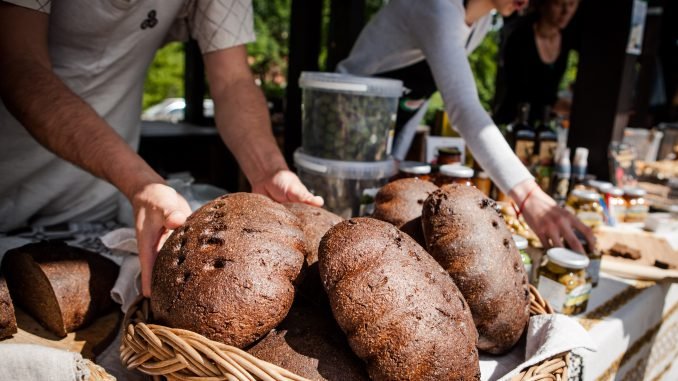
The Kalvarijų, Halės and Tymo farmers’ markets are popular shopping destinations for food products, and the expansive Gariūnai marketplace on the outskirts of Vilnius is also great for those that don’t mind the trip. With growing interest in organic or farm-direct products, one might expect to see a rise in business for those that work in the market stands, but that doesn’t seem to be the case.
“If anything, the amount of young people coming to shop here has stayed the same or fallen,” said Aivaras Stankevičius, who sells traditional Lithuanian dark rye bread at the Kalvarijų marketplace. He, along with many other market vendors, believes that supermarkets are the reason why a growing interest in organic and farm-direct food hasn’t exactly translated into higher profits.
Lithuania’s largest supermarket chains have all gone to great lengths to recreate the marketplace experience at their stores. Some stores feature “Kaimo” (“Village”) food displays complete with rustic décor that sell more-expensive and organic-certified products, while others allow tiny marketplaces to operate in their own parking lots. Vilnius Akropolis, one of the biggest shopping centers in the Baltic region, hosts a small farmers’ market outside its doors every Saturday. These commercial efforts to attract buyers directly or indirectly have all attracted people away from Vilnius’ dedicated marketplaces.
Vilnius’ marketplaces have been in a rush to modernize their facilities to attract more customers, but these efforts are not without their costs. Kalvarijų marketplace is currently undergoing a major four-year reconstruction project, and one of several new modernized facilities will be a paid parking lot. Paid parking, whether imposed by the company running the marketplace or the city, has been a thorn in vendors’ sides for a while, as many customers prefer the free parking offered by supermarkets. The vendors’ association at Halės marketplace even submitted a petition to Vilnius’ mayor, Remigijus Simašius, asking him to make the paid parking spots near their market building free for their customers during the market’s work hours.
One of the greatest advantages to shopping at a farmer’s market over a supermarket is the opportunity to speak to the people who produced the food you’re buying and ask them about its quality, or haggle over its price. Even these advantages are being threatened, however, as many vendors have started selling produce bought from commercial suppliers. In some cases, such produce supplements that of the vendor in question, while in others, it can be all they’re offering.
Vilnius’ farmers’ markets serve as low-priced alternatives for thrifty retirement-age consumers as well as direct sources of high-quality organic food products. It remains to be seen, however, if or how they will weather the growing competition they face and the changes brought on by the introduction of the Euro.


Be the first to comment